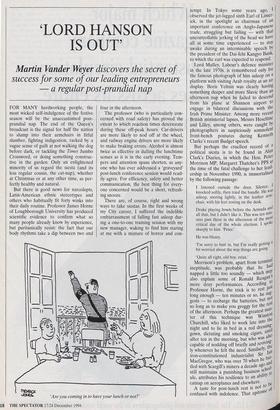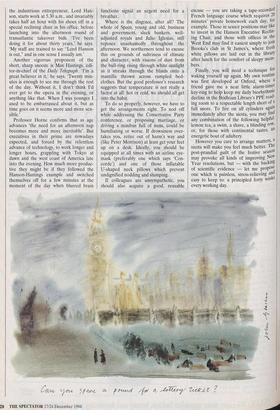`LORD HANSON IS OUT'
Martin Vander Weyer discovers the secret of
success for some of our leading entrepreneurs — a regular post-prandial nap
FOR MANY hardworking people, the most wicked self-indulgence of the festive season will be the unaccustomed post- prandial nap. The end of the Queen's broadcast is the signal for half the nation to slump into their armchairs in fitful slumber, fighting indigestion, racked by a vague sense of guilt at not walking the dog before dark, or tackling the Times Jumbo Crossword, or doing something construc- tive in the garden. Only an enlightened minority of us regard the siesta (and its less regular cousin, the cat-nap), whether at Christmas or at any other time, as per- fectly healthy and natural.
But there is good news for narcolepts, Latin-American ethnic stereotypes and others who habitually fit forty winks into their daily routine. Professor James Home of Loughborough University has produced scientific evidence to confirm what so many people already know by experience, but puritanically resist: the fact that our body rhythms take a dip between two and four in the afternoon.
The professor (who is particularly con- cerned with road safety) has proved the extent to which reaction times deteriorate during these off-peak hours. Car-drivers are more likely to nod off at the wheel, and railway engine drivers are more likely to make braking errors. Alcohol is almost twice as effective in dulling the lunchtime senses as it is in the early evening. Tem- pers and attention spans shorten, as any- one who has ever addressed a 'graveyard' post-lunch conference session would read- ily agree. For efficiency, safety and better communication, the best thing for every- one concerned would be a short, refresh- ing snooze.
There are, of course, right and wrong ways to take siestas. In the first weeks of my City career, I suffered the indelible embarrassment of falling fast asleep dur- ing a one-to-one training session with my new manager, waking to find him staring at me with a mixture of horror and con- `Are you coming in to have your lunch or not?' tempt. In Tokyo some years ago, I observed the jet-lagged sixth Earl of Limer- ick, in the spotlight as chairman of an important conference on Anglo-Japanese trade, struggling but failing — with that uncontrollable jerking of the head we have all at some time experienced — to stay awake during an interminable speech by the president of the Dai-Ichi Kangyo Bank, to which the earl was expected to respond.
Lord Mulley, Labour's defence minister in the late 1970s, is remembered only for the famous photograph of him asleep on a platform with visiting Arab royalty at an all display. Boris Yeltsin was clearly having something deeper and more Slavic than an afternoon nap when he failed to descend from his plane at Shannon airport to engage in bilateral discussions with the Irish Prime Minister. Among more recent British ministerial lapses, Messrs Heseltine and Lilley, among others, were caught by photographers in suspiciously somnolent front-bench postures during Kenneth Clarke's recent Budget speech. But perhaps the cruellest record of a political siesta is to be found in Alan Clark's Diaries, in which the Hon. peter Morrison MP, Margaret Thatcher's PPS at the time of the fatal challenge to her lead' ership in November 1990, is immortalised by the following passage: I listened outside the door. Silence. I knocked softly, then tried the handle. He was asleep, snoring lightly, in the leather arm- chair, with his feet resting on the desk.
Drake playing bowls before the Armada and all that, but I didn't like it. This was ten min- utes past three in the afternoon of the most critical day of the whole election. I spoke sharply to him. 'Peter.'
He was bleary.
`I'm sorry to butt in, but I'm really getting a bit worried about the way things are going- `Quite all right, old boy, relax.'
'n
Morrison's problem, apart from terminal d ineptitude, was probably that he napped a little too soundly — which may also explain some of Ronald Reagan5 more dozy performances. According, to Home, the trick is to rest Ps' long enough — ten minutes or so, he sug- gests — to recharge the batteries, but not so long as to make you groggy for the rest of the afternoon. Perhaps the greatest mas- ter of this technique was Winston" Churchill, who liked to work late into the night and to lie in bed in a red dressin!'f gown, dictating and smoking cigars, tol., after ten in the morning, but who was may capable of nodding off briefly and revivig; ly whenever he felt the need. Similarly, iron-constitutioned industrialist Sir "t_ MacGregor, who was over 70 when he bad tled with Scargill's miners a decade ag°i_a still maintains a punishing business sclie ule, attributes his resilience to an ability to catnap on aeroplanes and elsewhere- be A taste for post-lunch rest is not to of confused with indolence. That epitome
the industrious entrepreneur, Lord Han- son, starts work at 5.30 a.m., and invariably takes half an hour with his shoes off in a special reclining chair in his office, before launching into the afternoon round of transatlantic takeover bids. 'I've been doing it for about thirty years,' he says. `My staff are trained to say "Lord Hanson is out," and in one sense I usually am.'
Another vigorous proponent of the short, sharp snooze is Max Hastings, edi- tor-in-chief of the Daily Telegraph. 'I'm a great believer in it,' he says. 'Twenty min- utes is enough to see me through the rest of the day. Without it, I don't think I'd ever get to the opera in the evening, or anything like that. When I was younger I used to be embarrassed about it, but as time goes on it seems more and more sen- sible,'
Professor Home confirms that as age advances 'the need for an afternoon nap becomes more and more inevitable'. But executives in their prime are nowadays expected, and forced by the relentless advance of technology, to work longer and longer hours, grappling with Tokyo at dawn and the west coast of America late into the evening. How much more produc- tive they might be if they followed the Hanson-Hastings example and switched themselves off for a few minutes at the moment of the day when blurred brain functions signal an urgent need for a breather.
Where is the disgrace, after all? The whole of Spain, young and old, business and government, sleek bankers, well- adjusted royals and Julio Iglesias, still reposes unashamedly throughout the afternoon. We northerners tend to excuse this on grounds of sultriness of climate and character, with visions of dust from the bull-ring rising through white sunlight as it streaks through the blinds onto a mantilla thrown across rumpled bed- clothes. But the good professor's research suggests that temperature is not really a factor at all: hot or cold, we should all get into the habit.
To do so properly, however, we have to get the arrangements right. To nod off while addressing the Conservative Party conference, or proposing marriage, or driving a minibus full of nuns, could be humiliating or worse. If drowsiness over- takes you, retire out of harm's way and (like Peter Morrison) at least get your feet up on a desk. Ideally, you should be equipped at all times with an airline eye- mask (preferably one which says 'Con- corde') and one of those inflatable U-shaped neck pillows which prevent undignified nodding and slumping.
If colleagues are unsympathetic, you should also acquire a good, reusable
excuse — you are taking a tape-recorded French language course which requires 20 minutes' private homework each day, for example. Those in senior positions may like to invest in the Hanson Executive Reclin- ing Chair, and those with offices in the West End may find it easiest simply to join Brooks's club in St James's, where fresh white pillows are laid out in the library after lunch for the comfort of sleepy mem- bers.
Finally, you will need a technique for waking yourself up again. My own routine was first developed at Oxford, where a friend gave me a neat little alarm-timer key-ring to help keep my daily biorhythmic decline in the Bodleian Library's PPE read- ing room to a respectable length short of a full snore. To fire on all cylinders again immediately after the siesta, you may find any combination of the following helpful: lemon tea, a swim, a shave, a blinding row, or, for those with continental tastes, an energetic bout of adultery. However you care to arrange matters, siesta will make you feel much better. The post-prandial guilt of the festive season may provoke all kinds of improving New Year resolutions, but — with the backing of scientific evidence — let me propose one which is painless, stress-relieving and easy to keep to: a principled forty winks every working day.











































































































 Previous page
Previous page